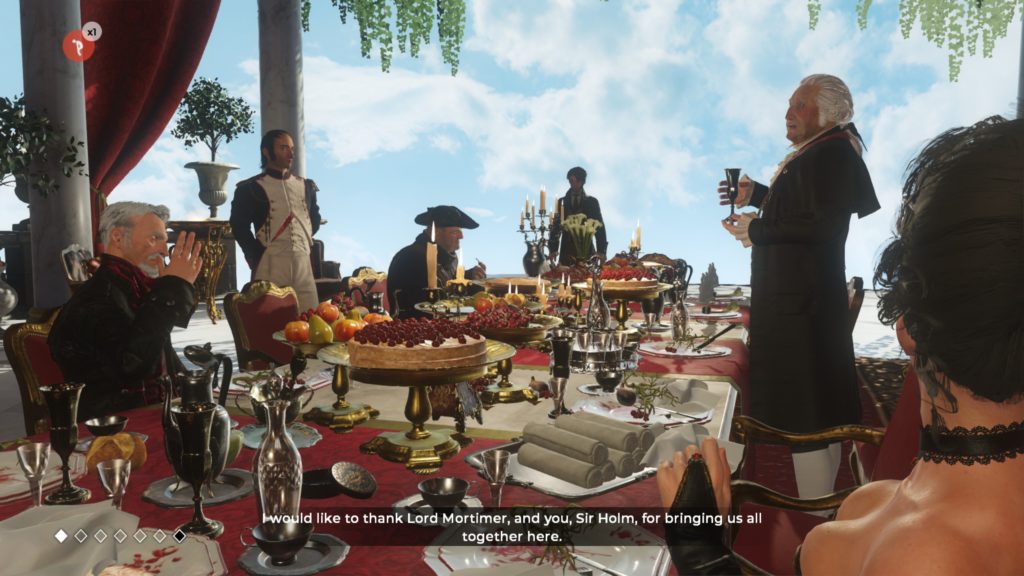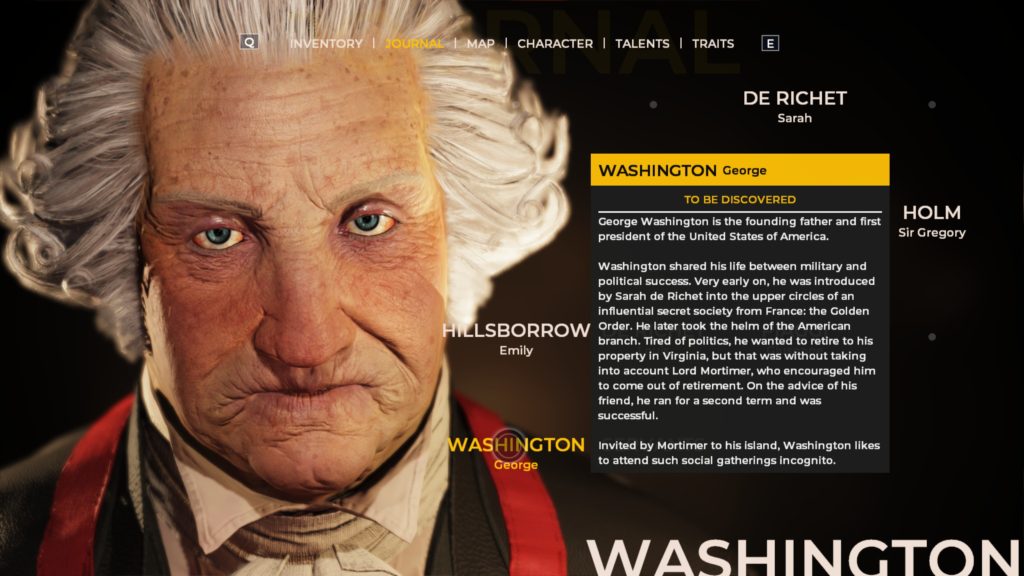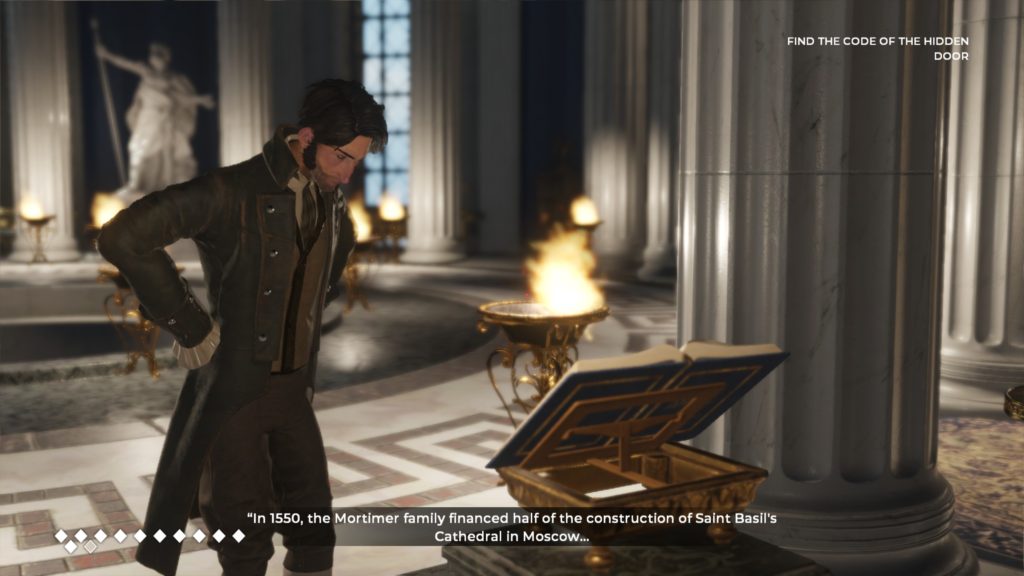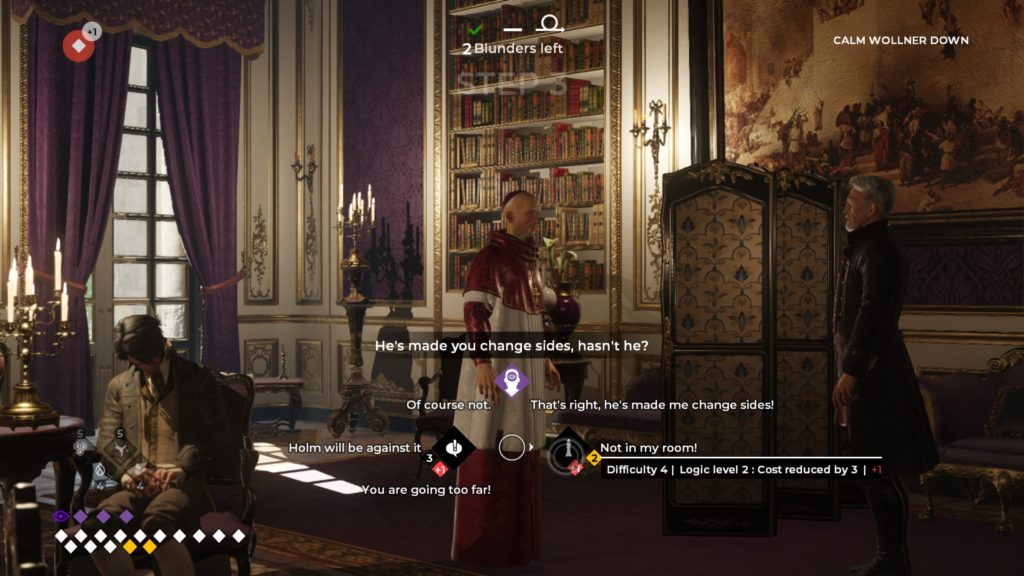
Here am I again indulging in my fondness for quirky indie games. This one is effectively an adventure game with the added twist being that it has some RPG mechanics. Originally released in an episodic format, the complete game offers a substantial amount of gameplay and the conspiracy-themed story is full of shocking twists and turns. Unfortunately as happens all too often in these narrative-based games, no matter your choices the story manages to arrive at the same very limited set of outcomes and the final episode is particularly disappointing.
The story is set in 1793 and the player is Louis de Richet. Your mother Sarah de Richet is an adventuress and founded of a secret society called the Golden Order which specializes in matters of the occult. After coming across a mysterious book known as Al Azif, she travels to the private island home of the reclusive Lord Mortimer without bothering to explain anything to you. Weeks later, you receive a letter from Mortimer saying that your mother has disappeared and inviting you to the island to help search for her. When you arrive, you discover that Mortimer has also gathered a number of illuminaries to his island at the same time for a council that will shake the world. Among them are Mortimer close associate Sir Gregory Holm as well as famous figures like George Washington, President of the newly formed United States, a young but promising French soldier named Napoleon Bonaparte and a representative of the Pope. Your job is therefore to find out what happened to your mother and what this Lord Mortimer is doing.

The game is set entirely within the confines of Mortimer’s manor and you interact only with the same set of a dozen or so characters. There is no physical combat, but there is a kind of social combat in which you try to convince a character to do something without saying the wrong thing. As such your character has a set of skills that can be useful. You pick one of three classes, the Diplomat, the Detective or the Occultist, each of whom are better at different things. Each NPC has vulnerabilities and immunities to different skills though you start off not knowing what those are. In addition skills are also used to gather clues in the world or accomplish things like picking locks. You can increase your skills as you level or boost them with objects. Finally using skills costs you effort points depending on the difficulty of the task and you need to replenish them through either rest or using consumables.
Most gamers will probably be surprised by how meaty these mechanics are compared to what we’re all used to in most adventure games. There’s even more in that you can collect and read manuscripts to increase your skills, or complete sets of them for ancillary bonuses. You’ll also be running around collecting consumables and amber pieces which can increase your overall number of effort points. This game can be a real pain for compulsive explorers as it isn’t enough to fully check out a place once. New objects can unexpectedly pop up in the places you’re already looked in later chapters. One problem is that the player feels highly constrained by these mechanics early on but as you level up, they barely matter at all later in the game. For example you should get all skills up level two as soon as possible, which is not that hard, and level three doesn’t matter at all. For the extremely high difficulty skill checks, just use the carmelite water item which makes the next use of a skill entirely free.

To me, the mechanics end up being up being more of a distraction than anything. The real draw remains the quality of the storytelling and how fun the puzzles are to solve. Leaving the story aside for the moment, the difficulty of the puzzles vary widely from the ones in the first episode that are so easy that they are barely puzzles at all to the head scratcher in the second episode in which they clearly overcompensated. There is logic in the puzzles however and using the proper skills can give you plenty of clues on how to solve them, in some case all but giving you the solution straight out. There are frequent references to history and in particular to Christianity and of course the game is crammed full of classical paintings and other works of art. Remembering what paintings you’ve seen and what they’re about can be key to solving some puzzles as well, which is a very nice touch.
As for the story, I had a lot of doubts early on about the plausibility of having all these famous figures out of history gathering together in one place but the game actually does anticipate and deals with this and other concerns, including how the player character can so easily manipulate these world leaders. I don’t want to give away too much of the plot so suffice to say that’s a crazy ride that has all the right elements to make for a great conspiracy theory. There’s murder, betrayal, long held family secrets and the sense that all of the great events in history have all been plotted out as chess moves in Mortimer’s parlor. One problem is that later developments are so dramatic that make earlier events seem irrelevant. For example, the cardinal is frantic about Catholic priests being killed in revolutionary France early on but he all but forgets about it later on. There are reasons why he behaves as he does but it’s obviously done to prevent the storyline from sprawling uncontrollably despite what you choose to do and it does cheapen the story.

Finally, as I mentioned earlier, the last episode is too short with an ending that is too abrupt and leaves too many questions unanswered to feel satisfying. As far as I can tell, which ending you get depends entirely on your decisions near the end of the game, another reason why early events seem not to matter at all. The epilogue tells you what happened to the other characters, but not Louis de Richet himself. In my case, I know that I survived but that’s it. There’s nothing else, what’s the state of Louis’ relationship with his mother or any of the other characters. Perhaps they originally meant there to be a next season but as it is, it feels so rushed. Overall this felt like a worthy experiment but it wasn’t an altogether successful one. It was innovative to try to add so many RPG elements to an adventure game but in the end I think it wasn’t a good idea. Still a worthwhile game for those who like the theme and the idea of playing as a investigator in the late 18th-century.